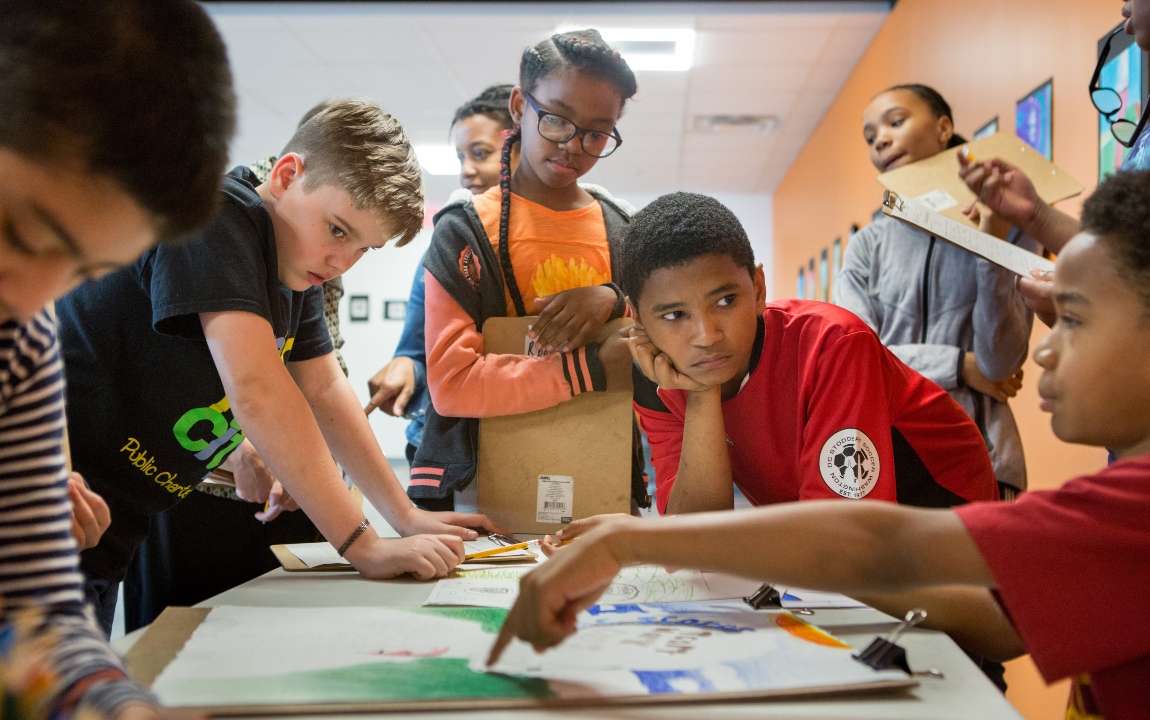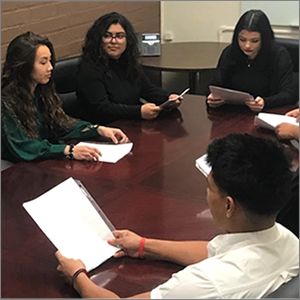 As many Project Based Learning practitioners can attest to, PBL is a rewarding instructional framework, but sometimes it can be expensive to implement: field trip costs, material costs, or even specialized software and technology costs that may not fit within a declining school budget. Moreover, authentic tasks or challenging problems that do the best job of motivating students to exhibit effort require adults beyond the classroom. Industry professionals and credible experts—who will usually be glad to help and don’t require extra funding—inspire students and help raise their performance. But where can a school in a marginalized neighborhood with few industry professionals and experts find them? Two of the keys to success are relationships and time.
As many Project Based Learning practitioners can attest to, PBL is a rewarding instructional framework, but sometimes it can be expensive to implement: field trip costs, material costs, or even specialized software and technology costs that may not fit within a declining school budget. Moreover, authentic tasks or challenging problems that do the best job of motivating students to exhibit effort require adults beyond the classroom. Industry professionals and credible experts—who will usually be glad to help and don’t require extra funding—inspire students and help raise their performance. But where can a school in a marginalized neighborhood with few industry professionals and experts find them? Two of the keys to success are relationships and time.
The need to leverage existing resources and relationships presented itself recently at Nueva Vista Continuation High School in Bassett Unified, located in an unincorporated part of Los Angeles County. Teachers collaboratively designed a week-long career readiness project that focused on:
- Technical writing standards (resume and cover letter)
- Presentation skills, which required attention to both speaking and listening skills
- Self-mastery, that extra magic that comes out in all meaningful projects, as students understand their potential greatness due to reflection and revision of project components.
Project Launch: Guest Speakers
The project launch event consisted of a series of teacher-invited guest speakers who talked about their career and the challenges they overcame growing up in the same neighborhood as the students. Students heard from a model, an LAPD officer, an LAPD detective, and a county level employment resource manager. The LAPD officer spoke to how he overcame several obstacles while growing up with similar struggles to the students’ own struggles. All the speakers demonstrated and spoke to hope with the students that need it the most.
The launch event was designed to connect students emotionally to the driving question: “How do I get prepared for a job interview?” It’s a question that many young people struggle with, a question that drives hopelessness in the hearts of the young especially when they see so much unemployment in their community.
Cover Letters & Resumes
 During the project, students worked on crafting cover letters that spoke to specific desires and characteristics that made them employable. Imagine young people, many of whom have given up on being asked to write about what makes them worthy to have a job when many older people around them are unemployed. Students interacted with teachers and support staff who shared examples of cover letters and developed an understanding of desirable employee qualities. Following the inquiry, students wrote their letters, which were short and truthful. The letters spoke to their desires for improving the lives of others and their families. Cover letter writing did not require lots of resources, but did require time spent on precision and revision, which provided the students hope for job searching.
During the project, students worked on crafting cover letters that spoke to specific desires and characteristics that made them employable. Imagine young people, many of whom have given up on being asked to write about what makes them worthy to have a job when many older people around them are unemployed. Students interacted with teachers and support staff who shared examples of cover letters and developed an understanding of desirable employee qualities. Following the inquiry, students wrote their letters, which were short and truthful. The letters spoke to their desires for improving the lives of others and their families. Cover letter writing did not require lots of resources, but did require time spent on precision and revision, which provided the students hope for job searching.
Students also spent time working on resumes. The students were challenged due to a lack of role models with jobs and very little positive activities or work experience. The project touched upon the kinds of experiences that should be shared in a resume and how to describe them appropriately. Students exhibited frustration several times with having to revise and adjust format, but saw the purpose in the end as they produced resumes properly formatted with appropriate content.
Public Performance
The culminating performance in the project was an interview day where students had to dress for success and be interviewed by two adults who they did not know. The school enlisted the support of our district’s technology department, who was more than willing to get out from behind the computers and servers to interview students for the first time in their lives. It was a no-cost transformative experience for many students. All it took was time to build the relationships with Bassett’s technology department to have them spend three hours supporting students directly on a Friday morning.
Students were interviewed with a premade set of generic questions and were rated on three criteria: speech development, logic, and delivery. The interviewers provided written feedback to the students to improve their chances in a real job interview. After the interviews, students reflected on the experience of the career week project and came away with one big takeaway that can change a life: “I had to spend time paying attention to what I put in writing. I had to pay attention to what I said during the interview. I can do this. I’m happy that I could do this!”
Post Project Reflection
After the week of work was completed, faculty spent time doing the “What Do You See” protocol to examine the student work completed. It became readily apparent that more time in crafting detailed cover letters would have helped students. More time on speaking skills development would have helped as well. Students did mock interviews with each other in preparation for Friday’s work, but maybe more time with adults doing interview preparation one-on-one could have increased student success.
Finally, a few words of wisdom to reiterate when implementing Project Based Learning in under-resourced neighborhoods:
- Do not discount the power of relationships to find people who want to work with young people (teachers can reach out to old friends and classified staff in the district office, who frequently want to help).
- Build hope into the project.
- Celebrate success and reflect on the quality of work immediately so that powerful professional learning happens.

